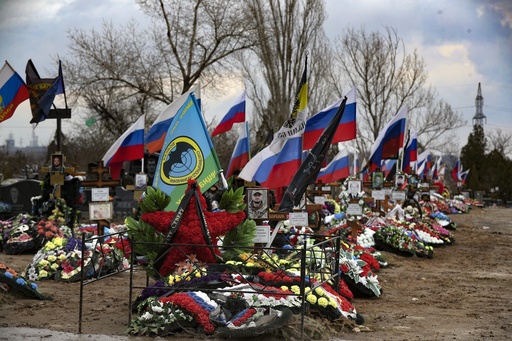
Nearly three years have passed since President Vladimir Putin launched his invasion of Ukraine, and recent reports indicate that Russian forces are steadily advancing on various fronts. In response, Ukraine is struggling with a shortage of manpower and military supplies, and the potential shift in U.S. leadership could lead to a significant reduction in military support for Ukrainian forces.
Experts from both Russia and the West have expressed concerns that Putin is closer than ever to fulfilling his objectives in Ukraine, with little motivation to engage in peace negotiations, regardless of the efforts made by U.S. President Donald Trump to persuade him. Recent discussions have seen both sides signaling their positions through a mix of flattery and intimidation.
Putin referred to Trump as “clever and pragmatic,” even echoing Trump’s unfounded assertions about the 2020 election. Trump, on the campaign trail, characterized Putin as “smart” and threatened to impose tariffs and reduce oil prices on Russia, which the Kremlin quickly dismissed.
Trump initially claimed he could resolve the conflict within 24 hours, later extending this timeframe to six months. He has suggested that the U.S. is engaging in dialogues with Russia regarding Ukraine which do not involve the Ukrainian government, highlighting that “very serious” discussions have already taken place.
He mentioned that he and Putin might soon take “significant” actions to end the conflict, despite the ongoing challenges Russia faces, including heavy casualties and severe Western sanctions leading to inflation and labor shortages. However, the Russian economy has not collapsed, and Putin’s intense crackdown on dissent leaves him free from domestic pressure to cease military operations.
Fyodor Lukyanov, who previously hosted a forum with Putin, noted that the Western belief suggesting a strong desire for peace on Putin’s part is misguided. He emphasized that Putin has no intention of reaching a settlement just to bring an end to the war.
Ukrainian President Volodymyr Zelenskyy has raised concerns that Putin’s desire is to negotiate directly with Trump, bypassing Kyiv entirely. This stance contradicts the Biden administration’s stance, which aligns with Zelenskyy’s assertion of “Nothing about Ukraine without Ukraine.” Zelenskyy articulated that it is crucial for Ukraine to be part of any discussions, emphasizing that Russian goals include undermining Ukrainian independence.
The Ukrainian leader warned that any agreement excluding Ukraine could signal to authoritarian regimes in China, North Korea, and Iran that aggression leads to rewards.
Putin appears to anticipate that Trump could weaken European unity on Ukraine, likening European leaders to submissive followers, suggesting they will soon align themselves closely with Trump’s directives. Trump, known for his negotiating skills, may overlook that Putin is unlikely to concede territories he views as integral to Russia’s heritage or to squander opportunities to exert pressure on the West.
While Trump may be eager to establish a peacemaking legacy, Sir Kim Darroch, the former British ambassador to the U.S., noted that history could judge him unfavorably if he allows significant concessions to Moscow. Concerns have also been voiced that a deal favoring Russia would portray the U.S. as weak.
Reflecting on previous interactions between Trump and Putin, former Finnish President Sauli Niinistö described their last meeting in Helsinki as one of mutual respect, though he acknowledged that their approaches differ significantly, with Putin being methodical and Trump more impulsive in decision-making.
Zelenskyy expressed skepticism that Putin can be trusted to negotiate in good faith, suggesting that Putin aims to create obstacles and undermine Ukrainian legitimacy. Putin’s strategy appears to involve waiting for Trump to lose interest or shift focus elsewhere.
Russian experts contend that past discussions have yielded little for substantive conflict resolution. For instance, during the Helsinki summit, Trump publicly sided with Putin over his own intelligence agencies regarding election interference.
Previous peace negotiations conducted early in the conflict, such as those in Istanbul, have shown that Russia’s terms included demands for Ukraine to declare neutrality and limitations on its military capabilities. Putin’s unwillingness to engage with significant Ukrainian demands underscores a lack of genuine intent to negotiate.
Putin’s stance appears to be that negotiations serve primarily to extract concessions from the West while legitimizing Russia’s position as a global power. Meanwhile, Trump’s ability to influence outcomes is complicated by the reality that many proposed economic measures likely lack the power to spark significant change in the war’s dynamics.
Trump’s assertion that Zelenskyy should have sought an agreement with Putin to prevent hostilities, coupled with threats of tariffs and sanctions, raises doubts about their potential effectiveness; the Kremlin seems largely unfazed, given the scale of existing Western sanctions.
While Trump has proposed leveraging global oil prices to pressure Putin into negotiations, Russian officials have countered that the conflict centers around national security interests and aren’t swayed by oil market fluctuations. Experts suggest that any shifts in U.S. energy policy may favor domestic producers over geopolitical concerns.
Trump might influence the situation further by supporting U.S. oil producers while simultaneously inducing China to limit its economic engagement with Russia, which could leave Moscow increasingly isolated. Additionally, European nations could solidify their ties with Ukraine by purchasing and supplying U.S. military equipment. The overarching question remains how Putin will respond in this climate of negotiations and pressures.

